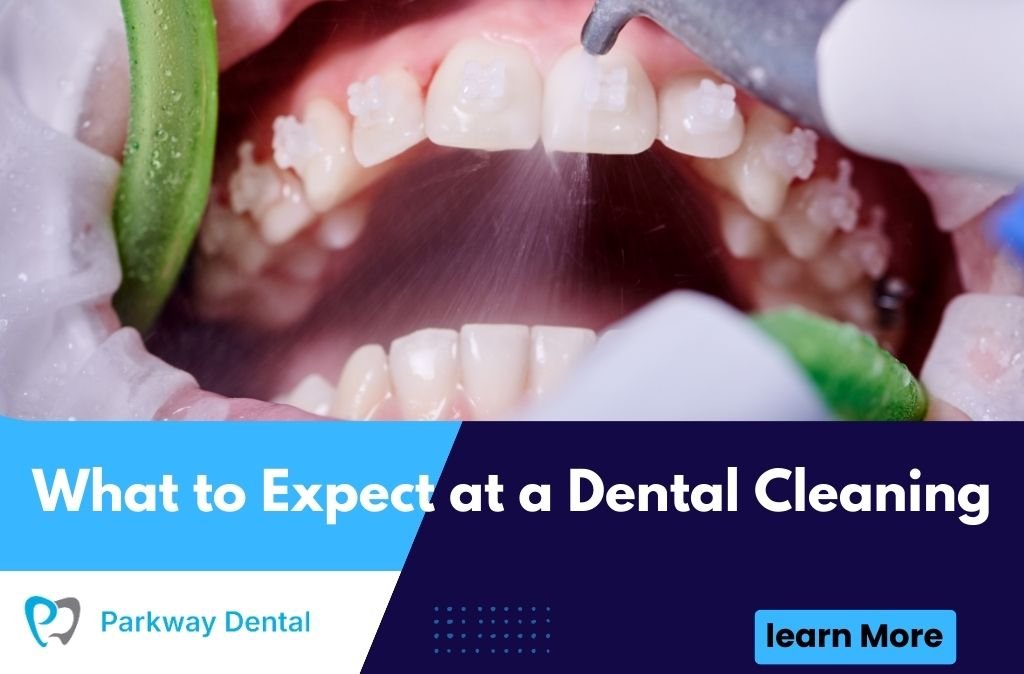Regular dental cleanings are an essential part of maintaining good oral health. Even if you brush and floss daily, professional cleanings remove plaque, tartar, and bacteria that at-home care simply can’t reach. Many patients wonder what happens during a teeth cleaning appointment, how long it takes, and whether it’s painful. This guide will walk you through the process, step by step, so you know exactly what to expect at a dental cleaning.
Why Dental Cleanings Are Important
A professional dental cleaning does more than polish your smile. It helps prevent gum disease, tooth decay, and bad breath while allowing your dentist to detect early signs of oral health problems.
Benefits of Routine Dental Cleanings
- Prevents cavities and tooth loss
- Reduces the risk of periodontal disease
- Improves overall health (oral bacteria can affect heart health and diabetes)
- Keeps your smile bright and confident
Preparing for a Dental Cleaning
Some patients feel anxious before their appointment, but preparation helps ease stress.
How to Get Ready for Your Cleaning
- Brush and floss your teeth before your visit to make the process smoother
- Share your medical history and any changes with your dentist
- Inform your dentist if you have sensitivity, gum issues, or take medications
- Drink water and avoid heavy meals right before your appointment
By taking these simple steps, you’ll make the visit more comfortable and effective.
What Happens During a Dental Cleaning?
A teeth cleaning appointment typically involves several stages. Each step plays a role in keeping your mouth healthy and free of buildup.
Initial Examination
The dental hygienist or dentist will examine your teeth and gums with a small mirror. They check for plaque, tartar, cavities, gum inflammation, and signs of oral disease. If problems are spotted, your dentist may adjust the cleaning plan.
Removing Plaque and Tartar (Scaling)
Using a scaler, your hygienist carefully removes plaque and tartar buildup from between your teeth and around your gumline. This is often the most important step, as tartar cannot be removed at home.
Deep Cleaning for Gum Health
If you have signs of gingivitis or periodontal disease, your dentist may recommend a deep cleaning (scaling and root planing). This involves cleaning beneath the gumline to stop infection and prevent further bone loss.
Polishing Teeth
After scaling, your hygienist polishes your teeth with a gritty toothpaste and a high-powered electric brush. This removes surface stains and smooths enamel, making it harder for plaque to stick.
Flossing and Rinse
Next, your teeth are flossed to remove debris between them. You’ll rinse your mouth with a fluoride or antibacterial solution to wash away remaining particles.
Fluoride Treatment
Some patients receive a fluoride treatment to strengthen enamel and protect against decay. This is especially helpful if you have a history of cavities.
Is Dental Cleaning Painful?
Most cleanings are painless, but patients with gum sensitivity or heavy tartar may feel mild discomfort. Your dentist can apply numbing gel or local anesthesia if you have severe anxiety or sensitivity.
Managing Sensitivity During Cleaning
- Communicate with your dentist if you feel discomfort
- Ask about topical numbing solutions
- Use sensitive toothpaste at home before and after your visit
How Long Does a Dental Cleaning Take?
A routine dental cleaning usually lasts 30 to 60 minutes. However, a deep cleaning may require two visits of up to 90 minutes each, depending on your oral health needs.
The Cost of Dental Cleaning
The average cost of a dental cleaning ranges from $75 to $200 without insurance. A deep cleaning may cost $150 to $350 per quadrant. Many dental insurance plans cover preventive cleanings every six months.
Factors That Affect Cost
- Type of cleaning (basic vs. deep)
- Location and dental practice
- Use of additional treatments (fluoride, X-rays, anesthesia)
Aftercare: What to Do Following a Dental Cleaning
Post-cleaning care helps maximize the benefits of your appointment.
Best Practices After Cleaning
- Avoid eating or drinking for 30 minutes if you had fluoride treatment
- Brush gently if gums feel sore
- Rinse with warm salt water to reduce irritation
- Stay consistent with brushing and flossing daily
Preventing Tartar and Plaque Between Cleanings
Daily oral hygiene is key to reducing tartar buildup and avoiding frequent deep cleanings.
At-Home Care Tips
- Brush twice daily with fluoride toothpaste
- Floss at least once a day
- Use an antibacterial mouthwash
- Limit sugary and acidic foods that erode enamel
- Schedule regular visits with your dentist
Conclusion
Knowing what to expect at a dental cleaning helps patients feel more comfortable and confident during their visits. These routine appointments are essential for keeping your teeth and gums healthy, preventing future dental problems, and maintaining a bright smile. If you’re overdue for a cleaning, now is the perfect time to schedule with an experienced dentist in West Roxbury, MA.
FAQs
How painful is dental cleaning?
Most patients feel little to no pain, though mild sensitivity is common.
How do you prepare for a dental cleaning?
Brush and floss before your appointment, and share medical details with your dentist.
Should you brush your teeth before going to the dentist for cleaning?
Yes, it helps the hygienist focus on deeper cleaning rather than food debris.
How long does basic dental cleaning take?
Typically 30–60 minutes.
What is the average cost for teeth cleaning?
$75–$200 without insurance.
What are the disadvantages of teeth cleaning?
Minor gum sensitivity or bleeding, which usually resolves in a day or two.
Why are dentists pushing deep cleaning?
Deep cleaning treats gum disease and prevents bone loss. It’s recommended when regular cleaning is not enough.
How is tartar removed?
With specialized dental instruments during scaling.
Is teeth cleaning really necessary?
Yes. It prevents decay, gum disease, and tooth loss.
What are signs you need a teeth cleaning?
Bad breath, bleeding gums, yellow buildup, or sensitivity.
Does mouthwash really help clean teeth?
Mouthwash helps reduce bacteria but does not replace brushing and flossing.
What if I never get my teeth cleaned?
You risk gum disease, cavities, tooth loss, and other serious oral health issues.






